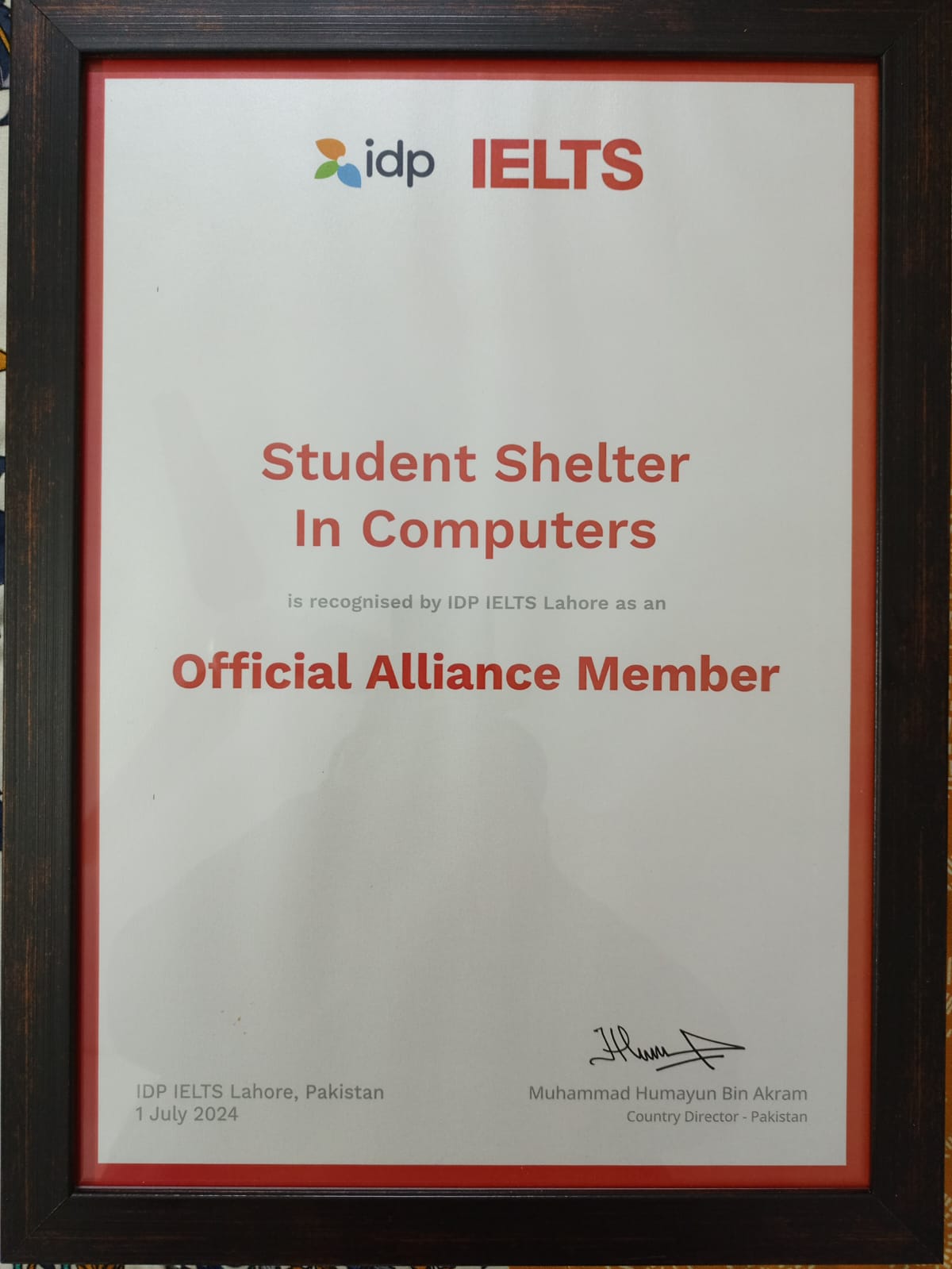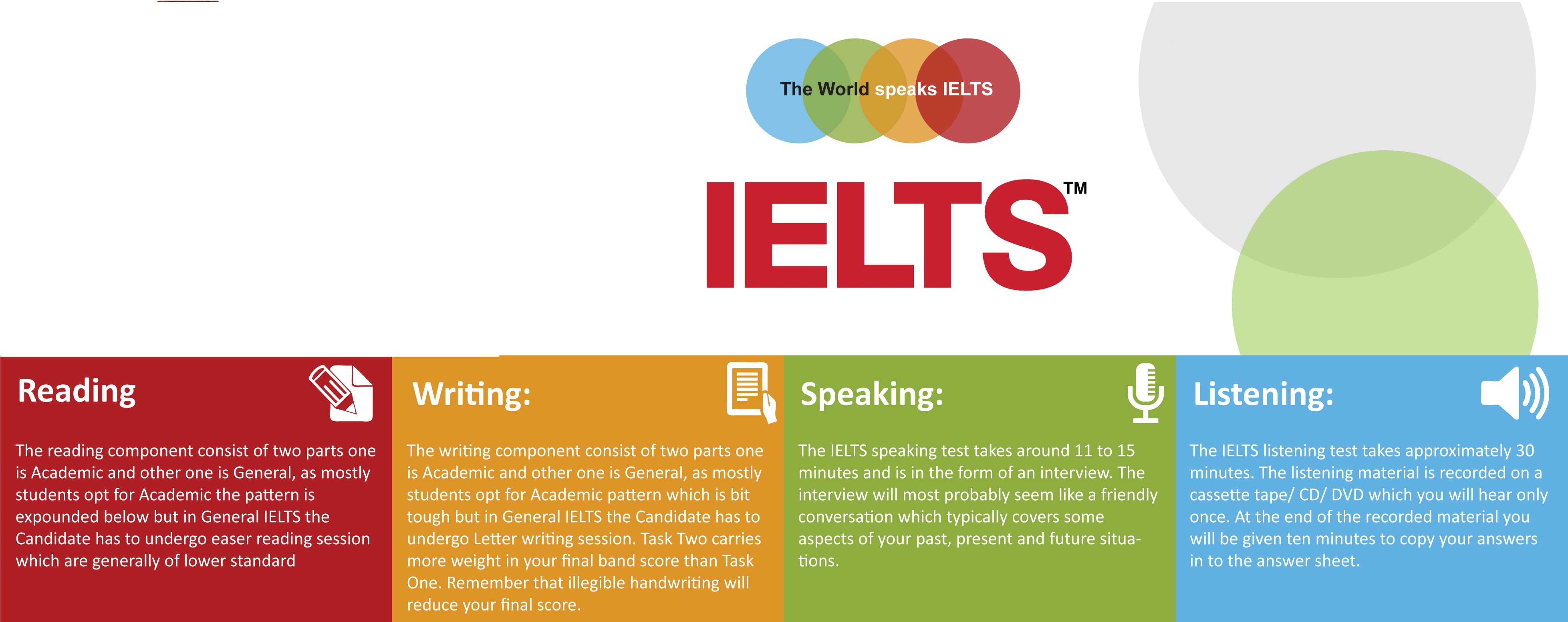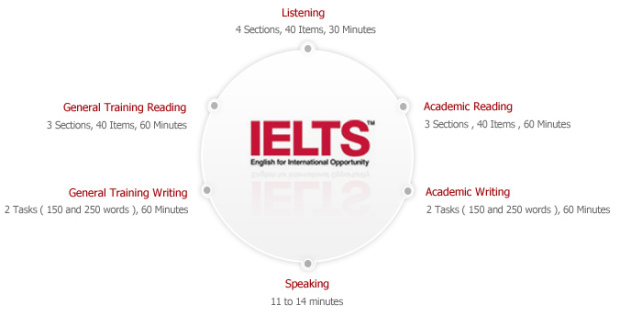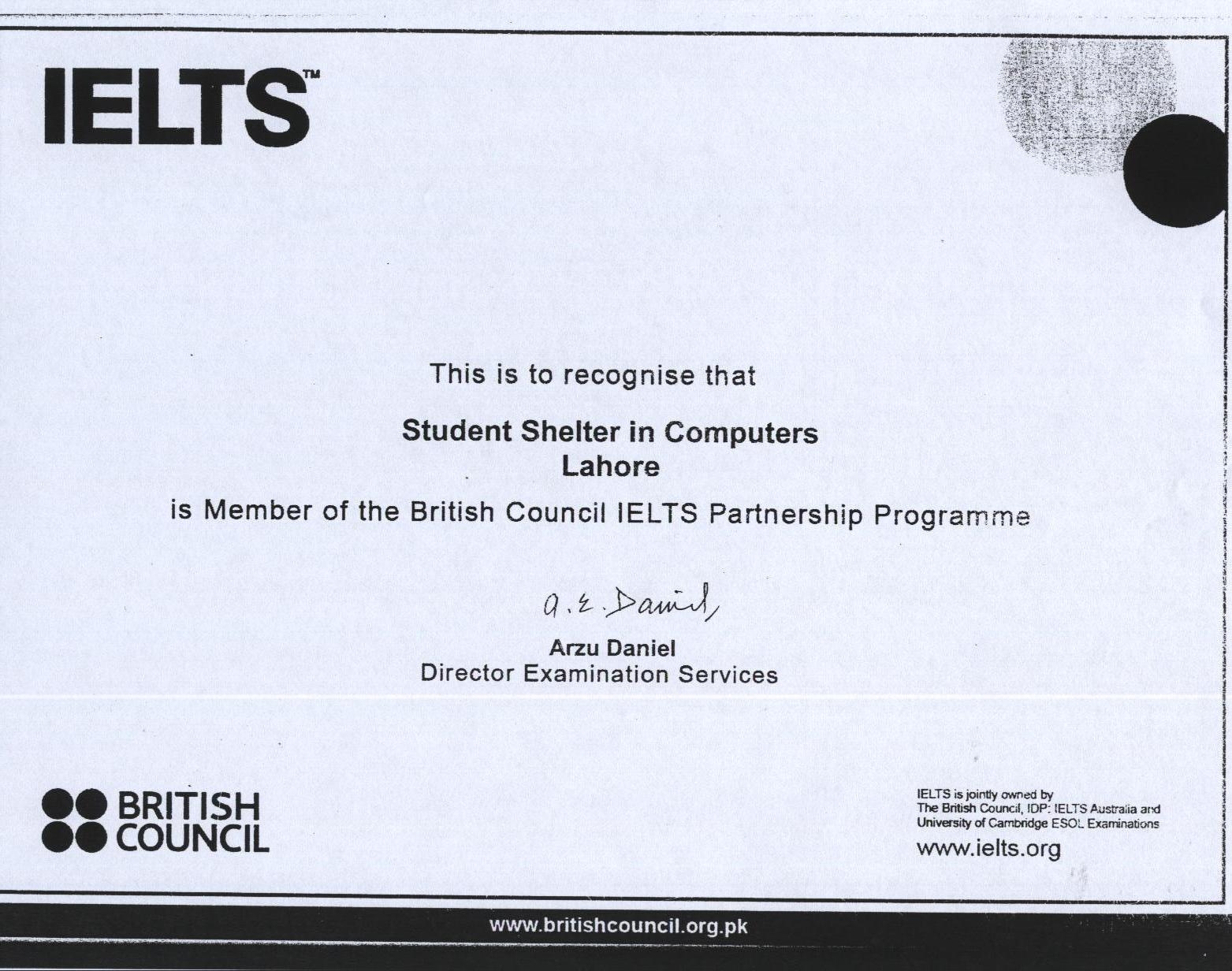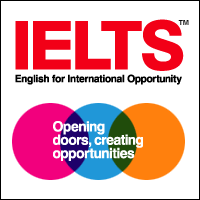IELTS tests the ability to listen, read, write and speak in English.
The speaking module is a key component of IELTS. It is conducted in the form of
a one-to-one interview with an examiner. The examiner assesses the test taker as
he or she is speaking. The speaking session is also recorded for monitoring and
for re-marking in case of an appeal against the score given.
A variety of accents and writing styles have been presented in test materials in
order to minimise linguistic bias. The accents in the listening section are
generally 80% British, Australian, New Zealander and 20% others (mostly
American).
IELTS is developed by experts at Cambridge English Language Assessment with
input from item writers from around the world. Teams are located in the USA,
Great Britain, Australia, New Zealand, Canada and other English-speaking
nations.
Band scores are used for each language sub-skill (Listening, Reading, Writing,
and Speaking). The Band Scale ranges from 0 ("Did not attempt the test") to 9
("Expert User").
IELTS Academic or IELTS General Training
IELTS is available in two test versions: Academic - for people applying for
higher education or professional registration, and General Training for those
migrating to Australia, Canada and the UK, or applying for secondary
education, training programmes and work experience in an English-speaking
environment. Both versions provide a valid and accurate assessment of the four
language skills: listening, reading, writing and speaking.
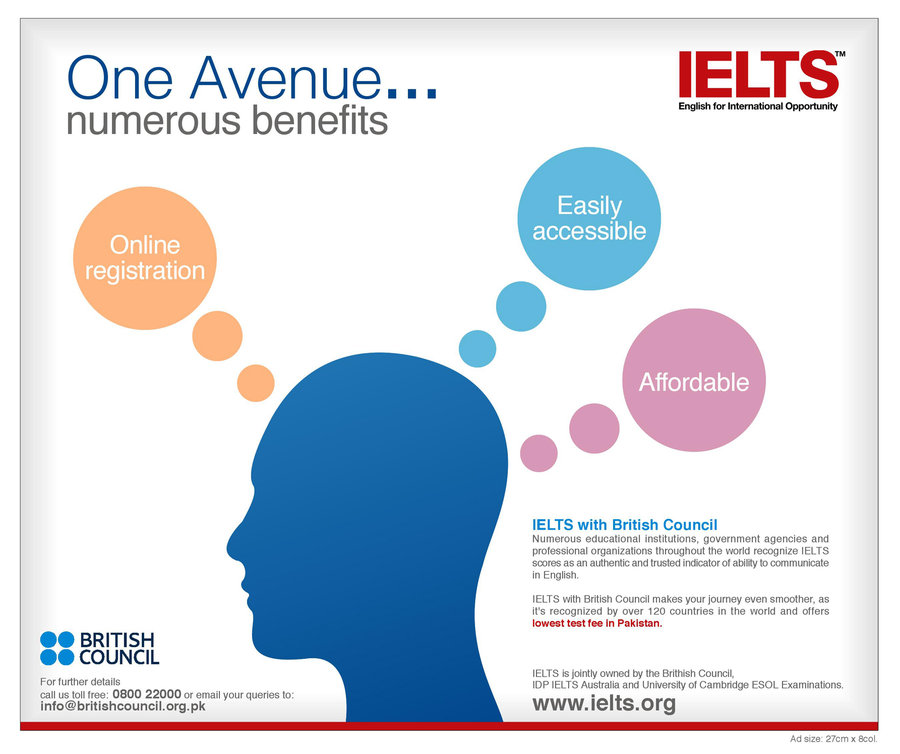
IELTS Institute in Pakistan
IELTS which is commonly known as the International English Language Testing
System is an internationally-owned and globally-recognized direct English
language test, which is taken for assessing the proficiency, quality and
integrity of a candidate. The IELTS test is a highly dependable, practical and
valid English language assessment primarily used by those seeking international
education, professional recognition, benchmarking to international standards,
global mobility, etc. IDP: IELTS Australia; The British Council and the
University of Cambridge ESOL examinations are the three organizations that take
responsibility together for the operation, development and distribution of this
examination. The IELTS test is conducted to test the ability of a student in
taking up the courses which are offered in the English language. Most of the
best universities in the countries like UK, Australia, Canada, and New Zealand,
prefers the IELTS test report as a mandatory proof of English proficiency, in
the admission requirement. The score that you need to obtain in IELTS for
clearing the eligibility criteria of admissions, may be varied out according to
your chosen course or university.English Spoken Training Institute in Lahore
Now, Western Overseas is known as the one of the best
IELTS Institutes in Pakistan by its best feature of delivering the
quality English language education. Also, at Western Overseas we are always
conducting the regular training programs for our students to enhance their
ability in all four aspects of communication like; Reading, Writing, Listening
and speaking. And with our best level of preparation, we ensure success to you
in the IELTS test. Western Overseas that enjoyed a leadership position in
English Language program named IELTS
coaching in Pakistan, Punjab regions for several years has now been
announced by IDP-Australia, as an award-winning IELTS coaching centre for two
consecutive years. This could be achieved only because of our exceptional
training program and dedicated trainers.
Aim of the Western Overseas is to generate more and more intelligent students
every year. With this aim, they have incepted their branches in the towns of
Lahore Pakistan. Faculty at the Western Overseas understands that every student
has born with different attributes and needs different treatment. Keeping this
in mind, Western Overseas offers different types of modules designed for
different types of students. These modules focus on practical learning of the
language and weaknesses of Pakistani learners. Because of these dedicated
services, they are known as a leading IELTS
Institute in Lahore. To know more about our learning programs, contact
us.
Familiarize yourself with the test format: The
first step towards IELTS
preparation is
to become familiar with the test format. Once you are aware of the test format,
you know what to expect in each section making it easier for you to attempt your
questions.
As a top
IELTS coaching centre, we employ various productive strategies of
IELTS coaching like Efficient Time Management, Mock Tests, Problem Solving and
Strategy Sessions to give our students the best training they need.
The IELTS is a globally recognized English test. Statistics show that over 1.4
million applicants take the test each year to apply for overseas education and
employment. Over 6,000 institutions in 140 countries recognize this test.
The IELTS is conducted in over 500 international centers, four times in a month.
A number of people from different backgrounds appear for the test, making it one
of the most accepted forms of international testing. This makes it imperative
for aspirants to plan a structured preparation before taking the IELTS.
All four forms of language skills – listening, reading, writing and speaking are
tested in IELTS. Among these, the speaking test is a face-to-face interview with
a certified examiner.
IELTS Exam Pattern and Syllabus:
In two hours and 45 minutes, the IELTS will aim to assess your listening,
reading, writing and speaking skills in English language. As mentioned above,
the two types of tests, IELTS Academic and IELTS General Training differ in
their reading and writing components, while listening and speaking tests are
same for both.
You have to take all three listening, reading and writing tests without any
break, in that order. Speaking test can be the same day or seven days before or
after the exam. You can check this option at your test centre.
Listening:
You will get 30 minutes to answer a number of questions basis four pre-recorded
audio tapes you will hear. There will be conversations related to everyday life
and in an educational setting. Two of the recordings will be monologues on an
academic subject as well as in social context.
Your answers will give away your understanding of the crux of the conversation
and detailed factual information, opinions and attitudes of speakers and your
ability to follow how the ideas develop in the process.
Speaking:
Around 15 minutes are dedicated to this section wherein the examiner will speak
to you on a wide range of topics as work, family, studies, interests, etc.
You will then be given a topic and one minute to prepare to be able to speak on
the topic for two minutes. The examiner will ask you more questions on the same
topic.
Reading:
A 60-minute test, it involves reading long texts taken from a number of sources.
For IELTS Academic test takers, the text will be descriptive suitable for those
wishing to appear for university courses. As for IELTS General Training, you
will get to read extracts related to life in general in English speaking
environments.
Based on the above, you will be required to answer 40 questions. The purpose of
these tests in both the contexts is to evaluate your reading skills and how well
are you able to exactly grasp the logical argument and the writers’ opinion.
Writing:
For both the tests, the assessors will judge you on the basis of your ability to
describe/summarise some text, argument, data, figures, graph, and the like
depending on what kind of test you are taking.
You will be required to write the same in formal, semi-formal or informal style,
depending on the task at hand in 60 minutes.
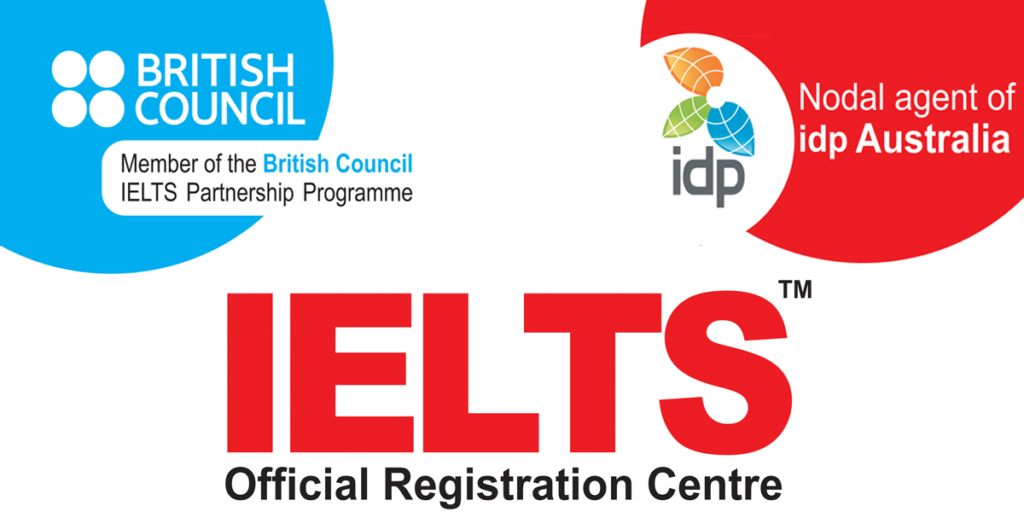
Top IELTS Institute in Pakistan
Student Shelter in Computers Training institute in Lahore Pakistan is
the No.1 IELTS Institute in Pakistan and is synonymous with quality
IELTS training. We have the honour of being the only institute in the
country to have Cambridge University Press as our knowledge partner.
Touchstone uses the official IELTS preparation material produced by Cambridge
University Press. Our trainers are also certified by Cambridge University
Press. Student Shelter in Computers offers the most comprehensive IELTS
training; and our programmes are crafted to give sufficient practice to
students in the techniques needed for taking the IELTS test with full
confidence. Our focused training gives the candidates a strong base in
English, with which they are able to score the highest bands in IELTS. Free English Language Training Classes in Lahore
Why IELTS?
Students aspiring to study in the topmost universities and colleges of the
English-speaking world need to clear an English language proficiency test.
Non-native speakers of English have to show that they can read, write, speak,
and understand English, so as to be able to follow lectures, study, take
exams, and interact comfortably with fellow students, teachers and the local
population. For this purpose as well as for the purpose of immigration, a
standardized English language proficiency test for non-native English speakers
has been established as a pre-requisite for the selection process. IELTS is
the world’s most popular English language proficiency test and a world of
opportunity awaits those who clear the required scores.
What is IELTS?
The International English Language Testing System (IELTS) is
conducted by three institutions, namely, the British Council, IDP: IELTS
Australia and Cambridge English Language Assessment (University of Cambridge).
IELTS Exam Preparation
Passing any examination smoothly requires at least 80% preparation and the
remaining 20% should come from putting the same into action. Once you have
understood the format for the kind of test you’d want to take, start skimming
through practice tests papers and answers.
You can take up these practice tests by factoring in the time you will be given
for taking the actual tests. These are available on the IELTS website where you
will also get answers to sample questions given. Separately, you can also buy
IELTS self-study books and related material that are available at British
Council tests centers and selected book stores across the globe.
PURPOSE :
IELTS is the most impartial and trustworthy English proficiency test available
for the purposes of study, work, and immigration. Most academic institutions
in English-speaking countries, like, Australia, Canada, New Zealand, the
United Kingdom, and an increasing number of educational institutions in the
United States, accept IELTS for study. For work purposes, many professional
organizations recognize IELTS as the standard test. For migration, IELTS is
required or accepted for permanent residency by the governments of the United
Kingdom, Australia, New Zealand and Canada.
VALUE :
IELTS is developed by education and language experts with a vast experience in
teaching English, conducting exams and producing educational content. IELTS
test material is exhaustively researched and is constantly in the process of
being reviewed and updated by experts and academics. In view of the varied
backgrounds, nationalities, genders, of the people taking the IELTS exam, care
is taken to ensure that the test is unbiased and neutral. It is an
internationally relevant test because it accepts both British and American
spellings. The test makes use of Australian, British and American accents,
thus covering the major English-speaking accents.
VERSIONS :
There are two versions of the IELTS test: IELTS Academic and IELTS General
Training. The purpose of both tests is different and the one you take will
depend on the requirements of the academic institution you plan to study in,
your work/professional or visa requirements.
IELTS Academic:
This test is meant for students wishing to study at universities and
institutes of higher education in countries where English is the medium of
instruction in the classroom. Many professions, like, medical, nursing,
engineering etc., also require an IELTS Academic result for registration. The
Academic test is designed to assess the proficiency in English required in an
academic and higher learning environment.
IELTS General Training:
This test is usually a visa requirement for those applying for permanent
residency to English speaking countries, such as, the United Kingdom,
Australia, New Zealand and Canada. Persons going to these countries for
training programs, employment or secondary education, are required to take
this test. IELTS General Training is intended to test the English skills that
an immigrant or a worker would need for communication in the workplace and in
an everyday environment.
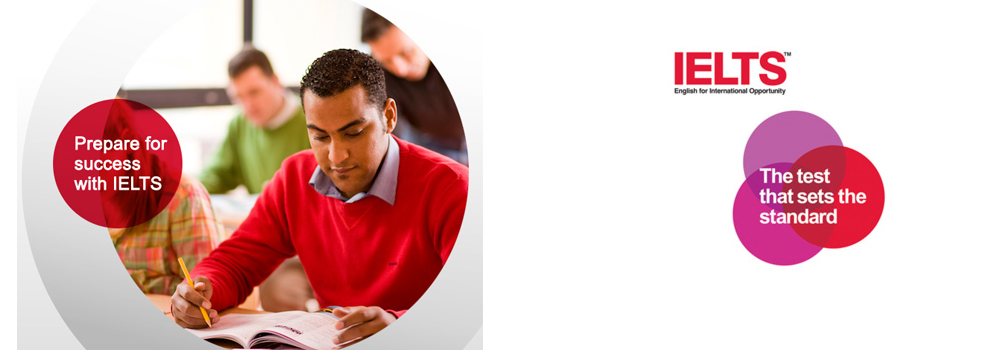
Band scale
There is no pass or fail. IELTS is
scored on a nine-band scale, with each band corresponding to a specified
competence in English. Overall Band Scores are reported to the nearest half
band. The following rounding convention applies: if the average across the four
skills ends in .25, it is rounded up to the next half band, and if it ends in
5.75, it is rounded up to the next whole band. The nine bands are described as
follows:
|
9 |
Expert User |
Has full operational command of the
language: appropriate, accurate and fluent with complete understanding. |
|
8 |
Very Good User |
Has fully operational command of the
language with only occasional unsystematic inaccuracies and inappropriacies.
Misunderstandings may occur in unfamiliar situations. Handles complex
detailed argumentation well. |
|
7 |
Good User |
Has operational command of the
language, though with occasional inaccuracies, inappropriateness and
misunderstandings in some situations. Generally handles complex language
well and understands detailed reasoning. |
|
6 |
Competent User |
Has generally effective command of the
language despite some inaccuracies, inappropriacies and misunderstandings.
Can use and understand fairly complex language, particularly in familiar
situations. |
|
5 |
Modest user |
Has partial command of the language,
coping with overall meaning in most situations, though is likely to make
many mistakes. Should be able to handle basic communication in own field. |
|
4 |
Limited User |
Basic competence is limited to
familiar situations. Has frequent problems in understanding and expression.
Is not able to use complex language. |
|
3 |
Extremely Limited User |
Conveys and understands only general
meaning in very familiar situations. Frequent breakdowns in communication
occur. |
|
2 |
Intermittent User |
No real communication is possible
except for the most basic information using isolated words or short formulae
in familiar situations and to meet immediate needs. Has great difficulty
understanding spoken and written English. |
|
1 |
Non User |
Essentially has no ability to use the
language beyond possibly a few isolated words. |
|
0 |
Did not attempt the test |
No assessable information provided at
all. |
IELTS and the CEFR:
|
IELTS Band Score |
CEFR Level |
|
9.0 |
C2 |
|
8.5 |
C2 |
|
8.0 |
Borderline C2/C1 |
|
7.5 |
C1 |
|
7.0 |
C1 |
|
6.5 |
Borderline C1/B2 |
|
6.0 |
B2 |
|
5.5 |
B2 |
|
5.0 |
Borderline B2/B1_ |
|
4.5 |
B1 |
|
4.0 |
B1 |
|
3.5 |
Borderline B1/A2 |
|
3.0 |
A2 |
|
2.5 |
A2 |
|
2.0 |
Borderline A2-A1 |
|
1.5 |
A1 |
|
1.0 |
A1 |
|
0.5 |
Non
user |
|
0.0 |
Did
not attempt the test |



